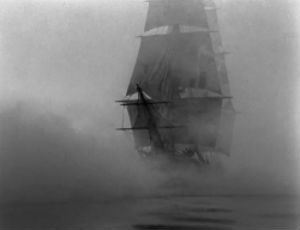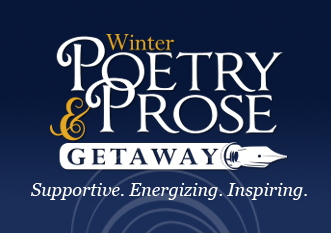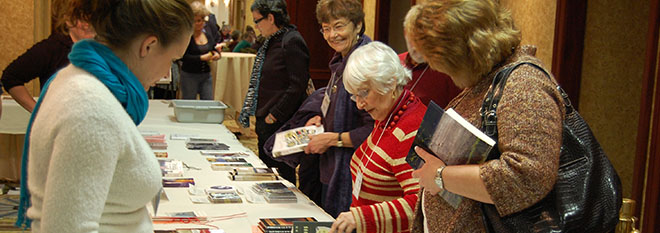Murphy Writing of Stockton University Presents

This entry is part of Getaway Reads, an e-mail series curated by Jamie Walters that features the writing of the Winter Poetry & Prose Getaway faculty.
from The Thrall’s Tale
by Judith Lindbergh

Einar owns me, the runes at my collarbone speak from the carved stone, smooth with wear. The amulet belonged to another before me, another thrall whose name is lost. They don’t remember even how she died, only that she did about the time that I was born.
At my birth I was named for the fire burning beneath the mountain’s ice, “Katla,” and the string was tied, and so I have ever worn it. I have always been a slave.
Then why the unfamiliar sorrow that I am leaving the only land I’ve ever known, this land of my bondage? Yet I gaze about me almost mournfully as my master, Einar, stands upon the shore, tall among the circle of chieftains, setting the last of the plans before we see this place no more. The only one taller is Eirik Raude himself, his flaming head bright beside the others’ mostly gray. It is he who planned this voyage to the great land to the west, beyond the open sea.
Serving at my master’s banquet table two years ago at Yule, I heard Eirik tell of its lush pastures and its deep fjords brimming with walrus, seals, and birds. “So broad and vast and rich, friend Einar,” he said. “Think on it! Think, if you dare, to come. Already there’s a fjord named for you. I’ve set it so myself – Einarsfjord! – all rich and green, the fairest farm save perhaps my own – and set beside mine, with naught between our mighty homesteads but a pasture thick with grass and moss so fresh, sprouting up to make your cows’ milk sweet and your sheep fat enough to slaughter even before the springtime’s melted snows.”
“You say ’tis such . . . ?” I saw my master raise a grizzled brow. “Well, to think on it. There’s naught so fine about this Iceland now. Thick it is with homesteads, and only the lowliest grounds left upon the ashen hills – barely enough to feed our sheep, yet quick run thick with blood and feud if others have first claimed it. Your talk is tempting, Eirik, almost too fair to be believed.”
“Yet you know me well, Einar.”
“That, old friend, I do. I would not cross you in a fight, or when you’re hard at drinking. Yet I’ll tell you, you are mostly honest, if hard-tempered. For this, I’ll think upon your offer and speak of it with my mistress, Grima. Yet what shall I tell her is the name of this new place?”
“Ah,” Eirik Raude full-smiled then, his teeth rough-chipped, yellowish some, and broken in his ruddy beard. “Greenland.” Slowly Eirik Raude did muse.
“Greenland.” And the sound of it, so thick and fresh and hopeful on my master’s tongue. So, and now, many months long past, we are set about to go.
I wait with the other thralls in a line before the plank. Einar’s hefty trader’s ship keens chorus with the other knarrs: twenty-five in all, each with bright-painted shields of wood and clanking metal hung upon their low-slung rails, and outstretched, dripping oars. Each is set to be captained by another master: Hafgrim, Herjolf, Ketil, Hrafn, even Helgi Thorbrandsson among their lot, all powerful here in Iceland once, but pushed out by hunger, vengeance, greed. They and all their households, their wives and sons, daughters and married kindred, and all their thralls, like me, packed to go to sea.
Such a crowd. All about are bondsmen’s scalps – bald pates, shaved and shining as this morning’s spring-ish dew – while we bonded women wear our best and only sheath of wadmal cloth, gray and drab and of a sweaty woolen, with a flaxen kerchief tied around our brows and braids. Nay, we look yet all the same, all dull and soiled, reeking, worn threadbare upon our elbows, while the freemen and their ladies nearly dance upon the Breidafjord rocks, flaunting all their finest, thickest woolens, their boots of fur and leather, their cloaks of seal, reindeer skins, and sometimes even bear with claws, all cheered and tucked and warm, set about to face the sea’s fierce chill.
The knarrs rock to and fro, jolted by each foot stepping cautiously from plank to deck. Beneath, the fjord’s waters brew up darkly. Barely I raise my chin above my bundle – small and coarse, it holds all that I possess. I press it tightly to my bosom. My heart pounds against it. Already, my skin is cold.
We crowd of thralls are thrust about. Upon a shouting, “Off!” we are pressed to let a horse, heavy-laid with bundles, pass. It steps upon the planking board, which sags, groaning loudly.
“Oh, ’twill break!” sudden the other thralls quick-whisper. “Or sink the ship!” “Nay, I’ll not ride upon it.” “Nor step – not another foot aboard.”
The master’s thrall’s-watch hears us. He comes, heavy with his step, a seal’s-gut cord twined about his fingers. “Hush you – all of you! Or upon your backs will fall our fate, as swift and ill as the whim of the weaving Norns.”
The fateful Norns – three weaving ladies. So we’re told they weave even upon the Norse gods’ fate. Old One-Eyed Odin, Frey and Freya, Frigga, and Thor, and even Loki fear them! I like it not to think upon them now, upon this coast, before this swaying board.
Yet the foreman’s words hush up the rest. The horse passes from the planking, settling in the hull of our master’s ship. More they load the knarrs, ever tighter with cattle, boxes, trunks, bags of meal and seed, packets of skin, and coiled rope. Around me, braying goats and sheep soil bundles we packed just last night or many weeks before, while the sea laps still and hungrily upon our clamor.
From the first, there had been talk of dread upon this trip – thralls’ talk, mostly – all fired up and wary. Grumbles, grunts, and reluctant groans from those who feared to stay or those to go. Well we knew Einar could not take us all. He would choose, and many terrored they’d be sold away. They trembled at their fate, looked about askance, plotted some, and planned and fretted mostly. I think I alone did not wonder much, for I knew then where my mother went I would surely be. And she would be with Einar. She had been his favorite – even until the day she died.
So, last spring, as I chored upon the hill watching old ships in the fjord raised up and repaired and fresh logs hewn to build new knarrs, I began with some excitement – and much unexpected dread – to realize we would truly leave this Iceland. Some say life is always better far away, where a slave might be freed if he proved his worth, or at least free to do somewhat more as he pleased; but I say life here is all I know. What lies ahead I cannot see.
With last autumn, the real preparations began, the storing and packing of grain, and drying of fish, and brewing mead, and catching fresh water from rains and streams in barrels lined with tar, and weaning lambs, and slaughtering sheep too old or sick to cross the ocean with us. And the selling of goods. I held the rag to catch my mistress’ tears over her chest of heavy oak with its sturdy iron lock, from which she removed her fine-wrought linens and gauzy silks brought from afar, and tapestries stitched by her grandmother’s hands, and other such treasures from her folk all long past, to be sorted, and many forsaken.
For me, there was cloth, too, to be woven for the sails. Had I known how hard and long and tedious the task, I might have thought to run away, but by the time I knew it, we were well into winter. There was nowhere to stray. Through the long nights and the cold, short days, we worked before the standing looms, weaving, ever weaving, until our arms ached, and our feet and our backs, and we could barely lift the threads. But at last the sails grew wide and strong. Just with springtime they were completed. We did not dye them as we might a Viking’s sails, for these were not for raiding or battles, unless to win this foreign shore. But it is said there will be no one to conquer. Where we go there are no people, only ruins of campfires and strange tooled bones. Still, some speak of draugs in the night, dead walkers who would lure us to the mountain and madness or worse. So much I fear I will be dragged away that once, in a fit of terror, I begged my master if it were true. But Einar promised, upon his soul, Eirik Raude had seen none.
As the ship’s builders set the mast secure and strung the rigging aloft, to the harbor we went, me, Inga, and Groa, with the tight-bound roll of cloth resting on our hips. There the strongest men set the sheet upon the yard and raised it up, “Pull! And pull!” blinding white in the noonday sun. It rippled until they rigged it sharp, then flooded full with the wind’s breath. We watched the new ship bound from the harbor toward the fjord’s mouth. In a moment it was out of sight. From where we stood we could see no farther than the hill where the homestead lay.
Now I stand before that very ship, with only the narrow plank to tie it still to shore, foreign though it is, as my mother always told me, though now she’s gone, buried beneath a shallow mound of earth, with a stone upon her feet to hold her still, and I am alone, with before me only the great black water and what lies unseen beyond.
© Judith Lindbergh. From The Thrall’s Tale, Plume Books, 2006.
+ + + + + + + + + +
The Winter Poetry & Prose Getaway and Murphy Writing are programs of Stockton University.
+ + + + + + + + + +
Want to study with Judith Lindbergh? Judith will lead the fiction portion of the Creative Writing Sampler at the 2017 Winter Poetry & Prose Getaway.
+ + + + + + + + + +
Judith Lindbergh’s debut novel, The Thrall’s Tale, about three women in the first Viking Age settlement in Greenland, was a Booksense (IndieBound) Pick, a Borders Original Voices Selection and praised by Pulitzer Prize winners Geraldine Brooks and Robert Olen Butler. Her work has appeared in numerous publications including Archaeology Magazine, Tiferet, Scandinavian Review, The World & I, Other Voices and, most recently, Up Here: The North at the Center of the World from University of Washington Press. She contributed to the Smithsonian Institution’s exhibition Vikings: The Norse Atlantic Saga and was an expert commentator on the History Channel’s documentary series MANKIND: The Story of All of Us. Judith is the Founder and Director of The Writers Circle where she teaches writers of all ages the joys and challenges of creative writing. To read some of her work, visit judithlindbergh.com or her blog.
+ + + + + + + + + +
Our Participants Say It Best
“Seriously, this may have been the best weekend of my life. I’m more of a memoir writer, but the Creative Writing Sampler so turned me on to poetry and fiction that I think I now want to dedicate myself to more advanced study of one of those. WHEN I come back to another Getaway, I might take something different only because this sampler workshop did such a great job.”
~ Brian, Mercerville, NJ
Our Philosophy
Escape the distractions of your busy life. Advance your craft and energize your writing with a challenging and supportive Writing Getaway. Join us at one of our upcoming writing retreats and take advantage of plentiful writing time, insightful feedback, good meals and good company. Get Away to Write.
+ + + + + + + + + +





